 Last additions - Ise дЉКеЛҐеЄВ Last additions - Ise дЉКеЛҐеЄВ |

My video of Ise Jingu Naiku on Jan. 1, 2013.Jan 21, 2013
|
|
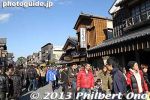
Oharai-machi shopping street outside Naiku entrance. Bus stop for the train stations and Geku is near here.Jan 14, 2013
|
|

Lucky bags.Jan 14, 2013
|
|

Jan 14, 2013
|
|

Dried fish.Jan 14, 2013
|
|
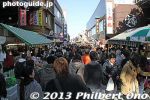
Right outside the entrance Naiku is a long shopping street called Oharai-machi, mainly food stalls. it leads to a parking lot. Very crowded on New Year's Day.Jan 14, 2013
|
|

Map of Naiku at Ise Jingu Shrine and adjacent area.Jan 14, 2013
|
|
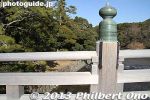
Uji Bridge is made of hinoki cypress wood. The bridge columns are made of keyaki.Jan 14, 2013
|
|
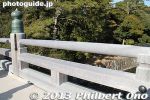
Uji Bridge showing its 20-year age.Jan 14, 2013
|
|
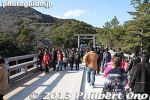
Crossing Uji Bridge on the way back.Jan 14, 2013
|
|

Isuzu River as seen from Uji Bridge. Water from this river is used in the shrine's ceremonies and rituals.Jan 14, 2013
|
|
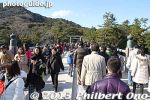
Uji Bridge on the way back.Jan 14, 2013
|
|

Jan 14, 2013
|
|
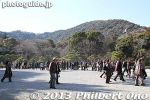
Where the people coming and going converge at Ise Jingu's Naiku.Jan 14, 2013
|
|
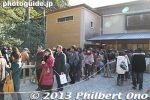
Much more popular than sake was amazake (sweet sake). This line was too long for me so I skipped it.Jan 14, 2013
|
|
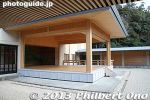
THe rest house had a view of a Noh stage.Jan 14, 2013
|
|

They served free green tea.Jan 14, 2013
|
|
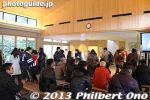
Inside Sanshuden rest house, a nice warm place to rest.Jan 14, 2013
|
|
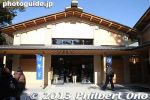
Sanshuden rest houseJan 14, 2013
|
|
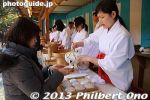
I wondered how much I should donate for this sake. I just dropped a 100 yen coin and probably got 20 yen worth of sake. At Atsuta Shrine (one of Japan's Big Three shrines) in Nagoya, they have a nice big hall where they serve hot tea and sweets for Nothing like that here.Jan 14, 2013
|
|
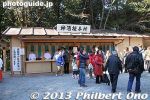
A sip of sake at this booth. I saw no indications of a fee for this sake, but there was a donation tray right there.Jan 14, 2013
|
|
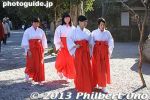
Ise Jingu shrine maidens look the same as any other shrine maidens. They are likely college students hired just for New Year's to sell goods.Jan 14, 2013
|
|
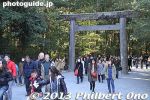
People still streaming toward Naiku shrine passing through the second torii.Jan 14, 2013
|
|
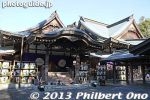
Kaguraden hall for sacred dances and prayers. еЖЕеЃЃз•Юж•љжЃњJan 14, 2013
|
|
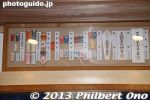
Imagine providing a service or product for which you need not worry about complaints, defects, malfunctions, errors, or failures. And the customer base is guaranteed forever. Jan 14, 2013
|
|
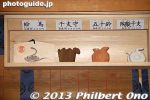
Snake souvenirs for sale. Major Shinto shrines make much of their income during New Year's.Jan 14, 2013
|
|
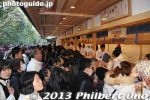
The great thing for them is that they need not provide any guarantee that your hopes, dreams, and prayers will come true for you. No such thing as a product warranty nor money-back guarantee.Jan 14, 2013
|
|
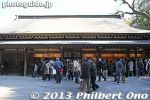
Shrine gift shop for amulets etc. Make no doubt, religion in Japan is very big business. They are in the business of selling hopes, dreams, prayers, ceremonies, and amulets. Jan 14, 2013
|
|
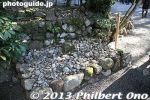
Jan 14, 2013
|
|
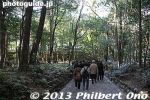
Jan 14, 2013
|
|
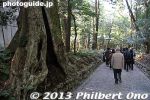
Way back.Jan 14, 2013
|
|
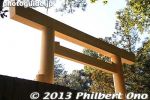
Brand new wooden torii.Jan 14, 2013
|
|
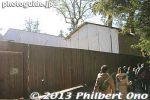
It takes 8 years to rebuild the Naiku shrine. So 12 years from now, they will start the rebuilding process all over again. Numerous ceremonies are held for this rebuilding, but only a few of them can be seen by the public.Jan 14, 2013
|
|
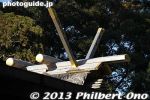
This is all we can see of the main shrine building called the Shoden (ж≠£жЃњ), the home of Amaterasu. The design of the shrine buildings are especially beautiful and awe-inspiring. Too bad we can't see it. There are photographs (especially by Yoshio Jan 14, 2013
|
|
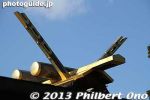
Roof horns at Ise Jingu's Naiku.Jan 14, 2013
|
|
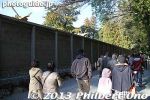
High walls prevent us from seeing the sacred shrine buildings of Naiku. Photography is not allowed inside these walls so don't try to use a long pole with a camera attached to take pictures. There are guards everywhere. Jan 14, 2013
|
|
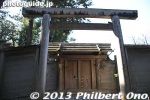
Side torii gate at Naiku.Jan 14, 2013
|
|
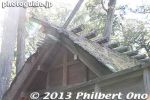
Jan 14, 2013
|
|
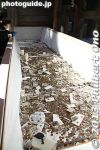
Small offertory box.Jan 14, 2013
|
|
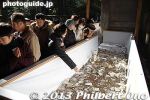
Look how small the offertory box is at Ise Jingu's Naiku. The one at Meiji Shrine in Tokyo is like half the size of a football field. Of course, Ise Jingu just doesn't have the space for it.Jan 14, 2013
|
|
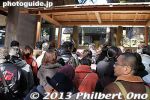
There was a money box under both the thatched roof and under the slim roof structure next to it. Either way, you can still pray at the shrine. Not a big deal if you don't go through the torii or don't pray from the center spot under the thatchedIt really looked like the people going up on the right edge were exiting without praying at the shrine. Not so. They could also pray at the shrine, but at an off-center position. Jan 14, 2013
|
|
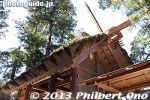
Jan 14, 2013
|
|
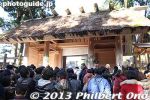
After going through the torii, they could pray at this center position under this thatched-roof gate in front of the shrine.Jan 14, 2013
|
|

The people who went up the right edge of the steps didn't go through the torii and could only pray at a temporary, off-center position under the slim roof seen here on the right of the thatched-roof gate. Jan 14, 2013
|
|
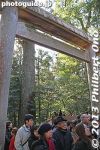
Naiku's bottleneck. These people took at least an hour to climb up the steps to go through this little torii. So it must've taken them at least 2 hours to get here from Uji Bridge. Normally it's a 10-15 min. walk.Jan 14, 2013
|
|
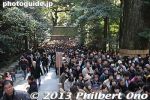
The scene from the top of the steps. People on the right are aiming for the torii. People on the left are shooting up the steps in no time.Jan 14, 2013
|
|
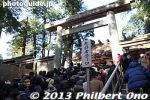
We didn't get to go through the torii, but it wasn't worth the wait. They never explained the difference between staying in the middle of the steps and going up on the right edge.Jan 14, 2013
|
|
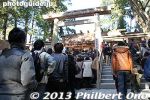
The bottleneck at Naiku was this little torii which most people wanted to walk through at the top of the steps. People like me who didn't have time opted to go up the steps on the right side in no time. Jan 14, 2013
|
|
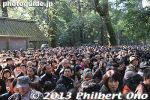
People behind me.Jan 14, 2013
|
|

Close up map of Naiku. An adjacent plot next the shrine is for the next rebuilding of the shrine. The current, 20-year-old Naiku shrine is on an adjacent plot of land. It takes 8 years to rebuild the Naiku shrine. So 12 years from now, they will start the rebuilding process all over again. Numerous ceremonies are held for this rebuilding, but only a few of them can be seen by the public.Jan 14, 2013
|
|
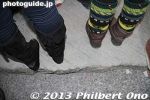
At the bottom of the steps going up to the shrine.Jan 14, 2013
|
|
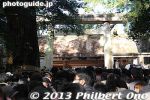
Naiku torii at the top of the steps.Jan 14, 2013
|
|
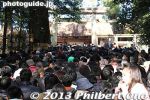
On the steps going up to Naiku shrine. This was where it got ridiculous. Literally a snail's pace.Jan 14, 2013
|
|
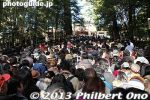
Naiku shrine and torii are in sight at the top of the steps ahead. We were told that it would take more than an hour just to get up these steps. However, we could walk up the steps quickly on the right edge of the steps.Jan 14, 2013
|
|
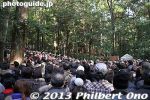
Getting closer to the bottom of the steps leading up to the Naiku shrine.Jan 14, 2013
|
|
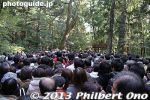
I could see the heatwaves from the people's bodies. Still inching forward.Jan 14, 2013
|
|
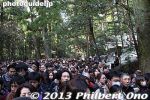
Lot of people here, but it's still not as crowded as Meiji Shrine in Tokyo.Jan 14, 2013
|
|
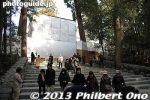
This is the steps leading to the new Naiku shrine that will be completed this fall 2013. The shrine buildings are already close to completion, but they are covered up.Jan 14, 2013
|
|
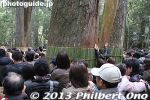
Bamboo strips protect the trees.Jan 14, 2013
|
|
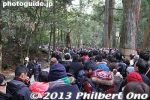
About 300-400 meters to the Naiku shrine, it got congested. It took about an hour to reach the foot of the steps going up to the shrine.Jan 14, 2013
|
|
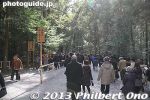
Still walking at a good pace.Jan 14, 2013
|
|
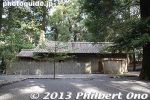
Horse stable.Jan 14, 2013
|
|
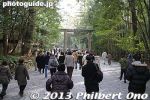
We could easily proceed from Uji Bridge to this Daini (Second) torii. So far so good.Jan 14, 2013
|
|

Dip your hands here in Isuzu River. Auto maker Isuzu was named after this crystal-clear river. дЇФеНБйИіеЈЭгБ®еЊ°жЙЛжіЧе†іJan 14, 2013
|
|
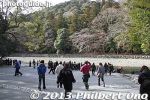
Another place to purify yourself on the banks of Isuzu River at this place called the Mitarashi. дЇФеНБйИіеЈЭгБ®еЊ°жЙЛжіЧе†іJan 14, 2013
|
|
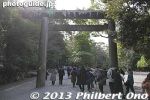
The first torii or Daiichi torii.Jan 14, 2013
|
|
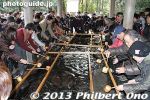
Before praying at the shrine, you're supposed to purify yourself. Wash your hands and rinse your mouth here. Use the ladle to pour water into your hand, then sip the water from your hand. Don't sip the water directly from the ladle. жЙЛж∞іиИОJan 14, 2013
|
|
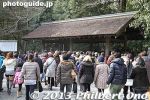
Water fountain where you wash your hands and rinse your mouth for purification. жЙЛж∞іиИОJan 14, 2013
|
|
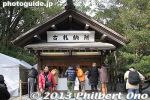
Place to dispose of old decorations bought from the shrine.Jan 14, 2013
|
|
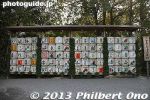
Barrels of sake as offerings.Jan 14, 2013
|
|

Jan 14, 2013
|
|
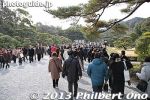
After crossing Uji Bridge, it is a gravel path to the shrine.Jan 14, 2013
|
|

The other end of Uji Bridge also has a torii gate.Jan 14, 2013
|
|
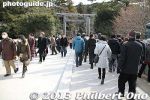
Jan 14, 2013
|
|
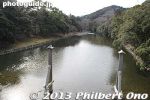
Uji Bridge goes over Isuzu River. дЇФеНБйИіеЈЭJan 14, 2013
|
|
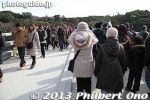
Uji Bridge is also rebuilt every 20 years.Jan 14, 2013
|
|

A guard watching over the crowd crossing Uji Bridge.Jan 14, 2013
|
|

Ise Jingu Shrine's Naiku is officially named, "Kotaijingu" (зЪЗе§Із•ЮеЃЃ). It worships Amaterasu Omikami 姩зЕІеЭРзЪЗе§ІеЊ°з•Ю, the ancestor of the Imperial Family and the tutelary kami of the Japanese people. Naiku was founded 2000 years aJan 14, 2013
|
|

Crossing Uji Bridge, a little over 100 meters long. еЃЗж≤їж©ЛJan 14, 2013
|
|
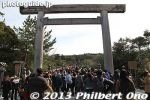
Ise Jingu Shrine's Naiku (Inner Shrine) is the main and most popular shrine at Ise. The shrine is rebuilt every 20 years and 2013 will mark the completion of the new shrine to replace the old one built in 1993.Jan 14, 2013
|
|
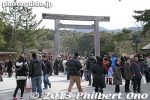
Torii gate at Uji Bridge. Very crowded with New Year's worshippers going for hatsumode prayers.Jan 14, 2013
|
|

Map of Ise Jingu's Naiku Shrine. First you cross Uji Bridge.Jan 14, 2013
|
|

Jan 14, 2013
|
|

Bus with motif promoting Ise. Going to worship at Ise Jingu is called "Ise-mairi."Jan 14, 2013
|
|

Colorful bus at Ise.Jan 14, 2013
|
|

Inside the bus going to Naiku from Ise-shi Station.Jan 14, 2013
|
|

Bus stop for Naiku Inner Shrine. This is near Ise-shi Station.Jan 14, 2013
|
|

Ise-shi Station platform upon arrival on Jan. 1, 2013. Ise Jingu's Geku Outer Shrine is a short walk from this station.Jan 14, 2013
|
|

Ise-shi Station with kadomatsu New Year's decorations.Jan 14, 2013
|
|

They are renovating the space in front of Ise-shi Station.Jan 14, 2013
|
|

White rocks to be placed at Ise Jingu Shrine for the rebulding.Jan 14, 2013
|
|

Ise-shi Station. дЉКеЛҐеЄВйІЕJan 14, 2013
|
|
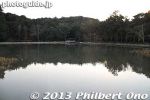
Magatama Pond next to Sengu-kan.Jan 14, 2013
|
|
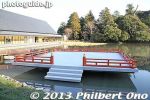
Outdoor stage at Sengu-kan.Jan 14, 2013
|
|
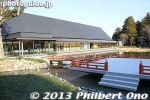
Sengu-kan Museum includes a scale model of the Geku shrine as well as a life-size facade of the main shrine building. Don't miss this museum. Jan 14, 2013
|
|
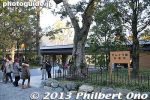
A new museum called Sengu-kan to commemorate the shrine's rebuilding for the 62nd time (since over 1,200 years ago).Jan 14, 2013
|
|
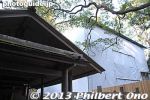
Taka-no-miya Shrine, old and new. е§Ъи≥АеЃЃ.Jan 14, 2013
|
|

Collecting coins at Taka-no-miya Shrine е§Ъи≥АеЃЃ.Jan 14, 2013
|
|
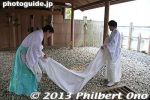
Collecting coins at Taka-no-miya Shrine е§Ъи≥АеЃЃ.Jan 14, 2013
|
|
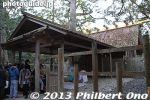
Taka-no-miya Shrine е§Ъи≥АеЃЃJan 14, 2013
|
|
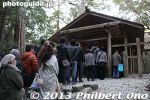
Taka-no-miya Shrine е§Ъи≥АеЃЃJan 14, 2013
|
|
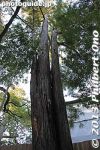
Jan 14, 2013
|
|
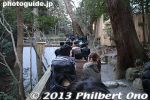
Long line to pray at Taka-no-miya Shrine. "Taka" literally means "many felicitations." е§Ъи≥АеЃЃJan 14, 2013
|
|
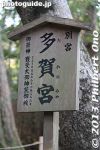
Taka-no-miya Shrine е§Ъи≥АеЃЃJan 14, 2013
|
|
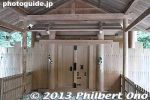
Tsuchi-no-miya Shrine еЬЯеЃЃJan 14, 2013
|
|

Tsuchi-no-miya Shrine еЬЯеЃЃJan 14, 2013
|
|
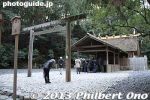
Tsuchi-no-miya Shrine worships the god in charge of the land around Geku. еЬЯеЃЃJan 14, 2013
|
|
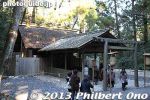
Kaze-no-miya Shrine is dedicated to the gods of wind and rain, essential for farming. 饮偁Jan 14, 2013
|
|
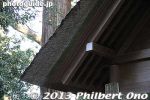
Kaze-no-miya Shrine 饮偁Jan 14, 2013
|
|
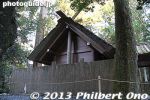
Kaze-no-miya Shrine 饮偁Jan 14, 2013
|
|
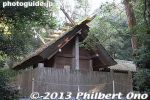
After praying at Geku, most people also visit three nearby affiliate shrines: Kaze-no-miya, Tsuchi-no-miya, and Taka-no-miya. This is Kaze-no-miya Shrine. 饮偁Jan 14, 2013
|
|
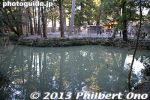
Adjacent pond.Jan 14, 2013
|
|
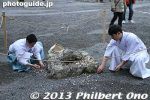
Collecting coins.Jan 14, 2013
|
|
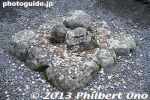
Jan 14, 2013
|
|

Jan 14, 2013
|
|

The shrine is rebuilt every 20 years and 2013 will mark the completion of the new shrine to replace the old one built in 1993. It takes 8 years to rebuild the Naiku shrine. So 12 years from now, they will start the rebuilding process all over again.Jan 14, 2013
|
|
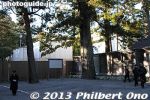
The new Geku Outer Shrine to be unveiled in Oct. 2013.Jan 14, 2013
|
|
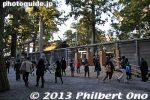
Geku Outer ShrineJan 14, 2013
|
|

Jan 14, 2013
|
|
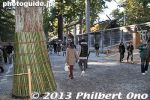
Jan 14, 2013
|
|
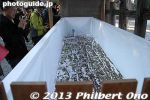
Look how small the offertory box is at Geku.Jan 14, 2013
|
|
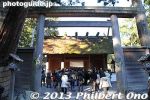
Entering Geku shrine at Ise.Jan 14, 2013
|
|
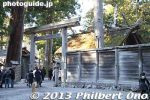
Jan 14, 2013
|
|
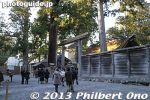
Jan 14, 2013
|
|
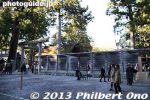
Geku Outer Shrine at Ise Jingu.Jan 14, 2013
|
|
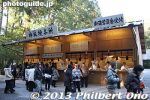
Amulets forsale.Jan 14, 2013
|
|
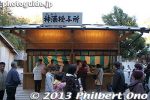
A sip of sake at this booth.Jan 14, 2013
|
|
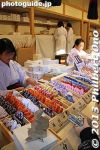
The great thing for them is that they need not provide any guarantee that your hopes, dreams, and prayers will come true for you. No such thing as a product warranty nor money-back guarantee.Jan 14, 2013
|
|
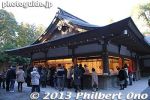
Shrine gift shop for amulets etc. Make no doubt, religion in Japan is very big business. They are in the business of selling hopes, dreams, prayers, ceremonies, and amulets. Jan 14, 2013
|
|
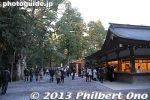
Jan 14, 2013
|
|
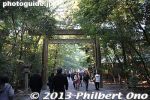
Jan 14, 2013
|
|

Sando path to Geku.Jan 14, 2013
|
|
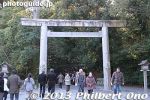
The first or Daiichi torii gate.Jan 14, 2013
|
|
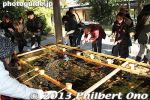
Before praying at the shrine, you're supposed to purify yourself. Wash your hands and rinse your mouth here. Use the ladle to pour water into your hand, then sip the water from your hand. Don't sip the water directly from the ladle. жЙЛж∞іиИОJan 14, 2013
|
|
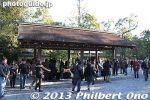
Water fountain where you wash your hands and rinse your mouth for purification. жЙЛж∞іиИОJan 14, 2013
|
|
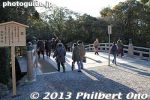
Path to Geku. зђђдЄАй≥•е±ЕеП£еПВйБУJan 14, 2013
|
|
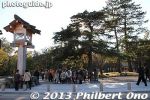
Geku entrance. Toyouke Omikami is also the god for food, clothing, and shelter. Geku was founded about 1,500 years ago.Jan 14, 2013
|
|

Geku is Ise Jingu's Outer Shrine (officially named "Toyouke Daijingu"). It is one of the two main shrines of Ise Jingu. Geku worships the god Toyouke Omikami, who is responsible for the food of Amaterasu Omikami worshipped at Naiku.Jan 14, 2013
|
|

Ise Tourist Information across from the Geku entrance. Very helpful.Jan 14, 2013
|
|
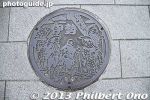
Ise manhole depicting Ise Jingu pilgrims. Mie Pref.Jan 14, 2013
|
|

Old ryokan inn.Jan 14, 2013
|
|

Sando path from Ise-shi Station to Ise Jingu Shrine's Geku Outer Shrine. A short walk. You're supposed to visit Geku before Naiku.Jan 14, 2013
|
|
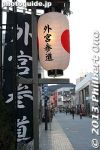
I noticed that Geku was much less crowded than Naiku and apparently most people visit Naiku only. Lantern along the path to Geku.Jan 14, 2013
|
|

Making sure that the rope is aligned and positioned correctly.Apr 23, 2007
|
|

The rope installers return to shore.Apr 23, 2007
|
|

The job is finished.Apr 23, 2007
|
|
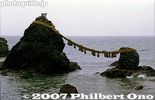
Wedded Rocks with a new rope. Japan has numerous other Wedded Rocks and stones, but this is by far the most famous.Apr 23, 2007
|
|
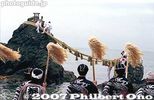
Apr 23, 2007
|
|
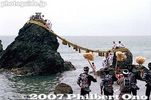
Apr 23, 2007
|
|
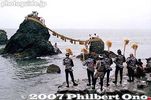
Apr 23, 2007
|
|
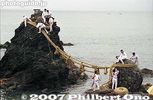
Replacing the rope for the Wedded Rocks, Mie Pref.Apr 23, 2007
|
|

Pieces of the old rope. Anyone could take home the pieces of old sacred rope if they wanted.Apr 23, 2007
|
|

Apr 23, 2007
|
|

Five ropes are being positioned and made taut.Apr 23, 2007
|
|

All the while, the cheering section chants and wave streamers.Apr 23, 2007
|
|
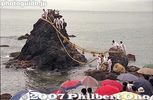
Apr 23, 2007
|
|
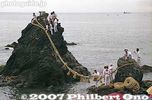
Apr 23, 2007
|
|

The second rope is installed.Apr 23, 2007
|
|

One by one, the men carefully positioned the new sacred ropes on the two Rocks. All the while, young children and young men are chanting on the shore.Apr 23, 2007
|
|
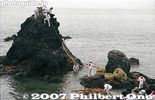
The new ropes are strung across the two rocks. A small rope tied to the end of the large rope is used to pull the large rope up the rock.Apr 23, 2007
|
|

The first rope is wound around both rocks.Apr 23, 2007
|
|
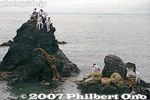
The old rope is taken away.Apr 23, 2007
|
|

Apr 23, 2007
|
|

The ceremony attracts a large crowd.Apr 23, 2007
|
|

The ropes are now completely cut, breaking the bond between the two rocks.Apr 23, 2007
|
|

The shimenawa rope actually consists of five smaller ropes. They cut the ropes one by one.Apr 23, 2007
|
|
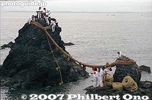
The men begin to cut off the old rope. Those sharp sickles soon made short work of the old sacred ropes which were brought ashore in small pieces.Apr 23, 2007
|
|

5жЬИ5жЧ•гАБ9жЬИ5жЧ•гБ®12жЬИдЄЛжЧђгБЂгБѓе§Ђе©¶е≤©гБЃе§Іж≥®йА£зЄДгБЃеЉµгВКжЫњгБИз•ЮдЇЛгБМи°МгВПгВМгВЛгАВгБУгВМгВЙгБЃеЖЩзЬЯгБѓ5жЬИ5жЧ•гБЂжТЃељ±гБХгВМгБЯгАВApr 23, 2007
|
|
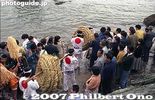
Men carry spanking-new shimenawa ropes to the rocks.Apr 23, 2007
|
|
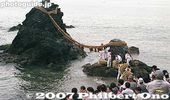
The Wedded Rocks are actually a type of torii gate for worshipping the Okitama Sacred Stone in the ocean.Apr 23, 2007
|
|

The torii on the larger rock is quite small. The sacred rope is replaced three times a year on May 5, September 5, and at the end of December.Apr 23, 2007
|
|
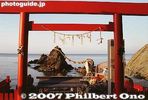
Futami Okitama Shrine does not have a main hall (Honden) like most other shrines. It worships the Okitama Sacred Stone in the ocean beyond the Wedded Rocks. дЇМи¶ЛиИИзОЙз•Юз§ЊApr 23, 2007
|
|

Lantern and sunset at Futami Okitama ShrineApr 23, 2007
|
|

The shimenawa rope bonding the Wedded Rocks is replaced three times a year. May 5, when these photos were taken, is one of the days when they replace the rope. First, they gathered at the shrine at 10 am for a 30-min. prayer ceremony.Apr 23, 2007
|
|

Sunset at Futami Okitama Shrine. In the old days when traveling was a hazardous undertaking in Japan, pilgrims who traveled to worship at the Ise Grand Shrines prayed here for a safe return home.Apr 23, 2007
|
|

The frog is Sarutahiko's messenger. Frog is called "kaeru" in Japanese, which is a homonym for the another word meaning "return home." If you travel a lot, pray here for a safe return. 姀婶е≤©Apr 23, 2007
|
|

Meoto-Iwa Wedded Rocks off the coast of Futami-cho, Ise city, Mie Prefecture. 姀婶е≤©Apr 23, 2007
|
|

The shrine is dedicated to Sarutahiko and Ukano-mitama. Sarutahiko is a god which serves as a pathfinder guide. Deities for land/sea transportation safety. дЇМи¶ЛпApr 23, 2007
|
|

The Wedded Rocks are part of Futami Okitama Shrine known for frog sculptures. дЇМи¶ЛиИИзОЙз•Юз§ЊApr 23, 2007
|
|
|
|
|